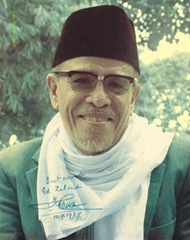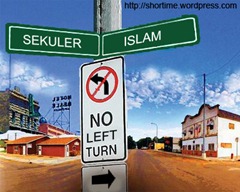Bagian Pertama
 HAMKA (Maninjau, Sumatra Barat, 16 Februari 190&-Jakarta, 24 Juli 1981). Seorang ulama terkenal, penulis produktif, dan mubalig besar yang berpengaruh di Asia Tenggara, ketua *Majelis Ulama Indonesia yang pertama. la adalah putra H Abdul *Karim Amrullah, tokoh pelopor gerakan Islam "Kaum Muda" di Minangkabau. la lahir pada masa awal gerakan "Kaum Muda" di daerahnya. Kama sebenarnya Abdul Malik Karim Amrullah. Sesudah menunaikan ibadah haji pada 1927, namanya mendapat tambahan "Haji" sehingga menjadi Haji Abdul Malik Karim Amrullah, disingkat HAMKA.
HAMKA (Maninjau, Sumatra Barat, 16 Februari 190&-Jakarta, 24 Juli 1981). Seorang ulama terkenal, penulis produktif, dan mubalig besar yang berpengaruh di Asia Tenggara, ketua *Majelis Ulama Indonesia yang pertama. la adalah putra H Abdul *Karim Amrullah, tokoh pelopor gerakan Islam "Kaum Muda" di Minangkabau. la lahir pada masa awal gerakan "Kaum Muda" di daerahnya. Kama sebenarnya Abdul Malik Karim Amrullah. Sesudah menunaikan ibadah haji pada 1927, namanya mendapat tambahan "Haji" sehingga menjadi Haji Abdul Malik Karim Amrullah, disingkat HAMKA.
HAMKA hanya sempat masuk sekolah desa selama 3 tahun dan sekolah-sekolah agama di Padangpanjang dan Parabek (dekat Bukittinggi) kira-kira 3 tahun. Tetapi, ia berbakat dalam bidang bahasa dan segera menguasai bahasa Arab, yang membuat ia mampu membaca secara luas literatur Arab, termasuk terjemahan dari tulisan-tulisan Barat. Sebagai seorang anak tokoh pergerakan, ia sejak kanak-kanak sudah menyaksikan dan mendengar langsung pembicaraan tentang pembaharuan dan gerakannya melalui ayah dan rekan-rekan ayahnya.
Sejak usia sangat muda, HAMKA sudah dikenal sebagai seorang kelana. Ayahnya bahkan menamakannya "Si Bujang Jauh". Pada tahun 1924, dalam usia 16 tahun, ia pergi ke Jawa; di sana menimba pelajaran tentang gerakan Islam modern melalui H Oemar Said Tjokroaminoto, Ki Bagus Hadiku sumo (ketua Muhammadiyah 1944-1952), RM Soerjopranoto (1871-1959), dan KH Fakhruddin (ayah KH Abdur Rozzaq *Fakhruddin) yang mengadakan kursus-kursus pergerakan di Gedung Abdi Dharmo di Pakualaman, Yogyakarta. Setelah beberapa lama di sana, ia berangkat ke Pekalongan dan menemui kakak iparnya, A.R. Sutan Mansur, yang waktu itu ketua *Muhammadiyah cabang Pekalongan. Di kota ini ia berkenalan dengan tokoh-tokoh Muhammadiyah setempat. Pada bulan Juli 1925, ia kembali ke Padangpanjang dan turut mendirikan Tablig Muhammadiyah di rumah ayahnya di Gatangan, Padangpanjang. Sejak itulah ia mulai berkiprah dalam organisasi Muhammadiyah.
Pada bulan Februari 1927, ia berangkat ke Mekah untuk menunaikan ibadah haji dan bermukim di sana lebih kurang 6 bulan. Selama di Mekah, ia bekerja pada sebuah percetakan dan baru pada bulan Juli kembali ke tanah air dengan tujuan Medan dan menjadi guru agama pada sebuah per-kebunan selama beberapa bulan. Pada akhir tahun 1927, ia kembali ke kampung halamannya.
Pada tahun 1928 ia menjadi peserta Muktamar Muhammadiyah di Solo, dan sejak itu hampir tidak pernah absen dalam Muktamar Muhammadiyah hingga akhir hayatnya. Sepulang dari Solo, ia mulai memangku beberapa jabatan, mulai dari ketua bagian Taman Pustaka, kemudian ketua Tabligh, sampai menjadi ketua Muhammadiyah Cabang Padangpanjang. Pada tahun 1930, ia diutus oleh Pengurus Cabang Padangpanjang untuk mendirikan Muhammadiyah di Bengkalis. Pada tahun 1931, ia diutus oleh Pengurus Pusat Muhammadiyah ke Makassar (kini Ujungpandang) untuk menjadi *mubalig Muhammadiyah dalam rangka menggerakkan semangat untuk menyambut Muktamar Muhammadiyah ke-21 (Mei 1932) di Makassar. Pada tahun 1934, ia kembali ke Padangpanjang dan diangkat menjadi Majelis Konsul Muhammadiyah Sumatra Tengah.
bersambung



